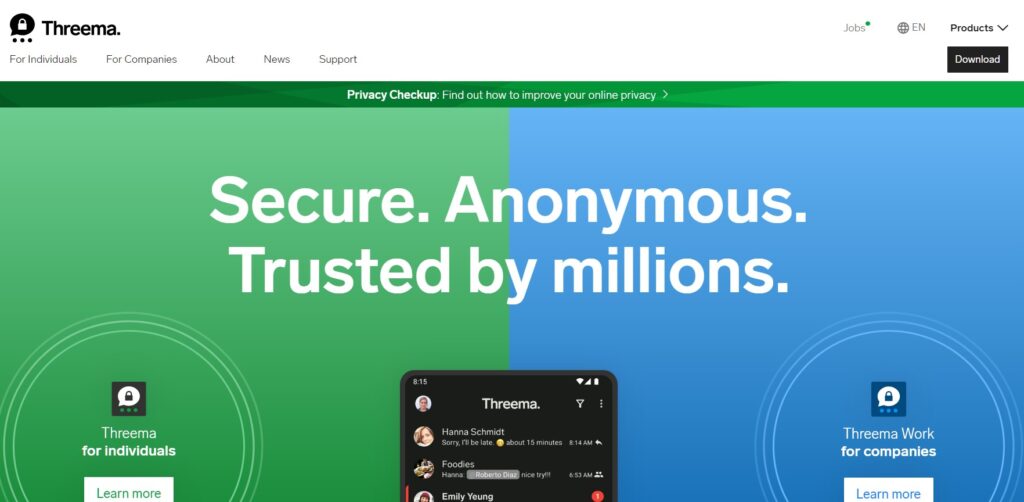

Is Telegram safe? Assessing Security Risks and Potential Alternatives

Telegram is a popular messaging app known for its secure end-to-end encrypted chats and video phone calls. However, amidst its reputation for privacy, questions linger: Is Telegram truly safe?
In this post, we’ll review the app’s security features, and potential vulnerabilities, and find out whether it’s the right choice for safeguarding your online communications.
Is Telegram Encrypted?
While Telegram is marketed as the best solution in terms of safe private messaging, it’s essential to understand its encryption protocols.
The cornerstone of secure messaging lies in end-to-end encryption (E2EE), ensuring that only the sender and receiver can access the messages. However, Telegram lacks default E2EE, meaning messages are accessible to the platform itself. Although messages are encrypted during transit to and from Telegram’s servers, they remain unencrypted on the servers, leaving them vulnerable to potential breaches.
Telegram provides end-to-end encryption exclusively through its secret chat feature. This feature employs client-to-client encryption: the recipient uses a special cryptographic key pair with its counterpart stored on your device, rather than relying on Telegram’s servers.
While “secret chats” offer E2EE as an option, it’s important to note that they must be initiated manually, leaving default chats potentially exposed.
Telegram Security Concerns
When using Telegram, it’s crucial to be aware of these security concerns:
- User data storage. Telegram stores user data, including usernames, IP addresses, and device information, on its servers for up to 12 months. While they claim to share this data with authorities only under specific legal circumstances, there have been cases of data breaches leading to user information appearing on the dark web.
- People Nearby feature. This feature allows users to see others nearby, not limited to contacts but any user with the feature enabled. Hackers have exploited this feature to access precise location data, so it’s advisable to disable this feature if privacy is a concern.
- Open-source status. While Telegram is considered open-source, only the client-side code is open for inspection. The server-side code remains closed, including their unique encryption protocol, MTProto. It’s generally safer to rely on well-established cryptography libraries rather than proprietary protocols with undisclosed code.
Best Telegram Alternatives
While Telegram is highly popular for its privacy-focused features, there is a number of other messaging apps that offer comparable security. Below, we’ve outlined three such alternatives that share Telegram’s commitment to privacy.
Signal
Signal stands out as an excellent choice for secure communication among messaging apps. It ensures end-to-end encryption by default for voice calls, video calls, and instant messages, using open-source Signal Protocol. Signal’s technology safeguards metadata and only records necessary user data, such as phone numbers, during account setup.

WhatsApp’s utilization of end-to-end encryption across all message types, coupled with its widespread adoption, positions it as a top choice for secure messaging. However, a common concern among users is its ownership by Meta, a company not widely recognized for prioritizing user privacy. Although Meta cannot access your WhatsApp messages due to encryption, it does gather usage data from the platform.

Threema
Threema is a paid Swiss-made cross-platform messaging app.
Threema ensures strict end-to-end encryption, preventing anyone, including Threema itself, from accessing transmitted messages. Users can opt for complete anonymity without providing personal data like phone numbers or email addresses. The service prioritizes data protection and privacy (Privacy by Design), minimizing the generation of metadata during usage.
For individual users, Threema costs around $5 to download from the App Store. Threema.Work, designed for companies, starts at $2 per month per user.

Tips For Using Telegram Safely
While Telegram offers better privacy than many mainstream messaging apps, it still has limitations in terms of online security. It’s important to remain cautious online and consider implementing extra security measures whenever using Telegram.
- Enable two-factor authentication (2FA) for added security.
- Use strong, unique passwords to protect your account.
- Adjust privacy settings in the app to control who sees your information.
- Keep the Telegram app updated to protect against cyber threats.
- Utilize Telegram’s “Secret chat” feature for end-to-end encrypted messaging.
- Consider installing a VPN for additional online privacy and security.
It’s worth noting that Telegram hasn’t escaped the attention of scammers, who exploit its vast user base. For more information on prevalent Telegram app scams and how to avoid them, check out our dedicated blog post.
Final Thoughts
In conclusion, it’s crucial to be aware of Telegram’s privacy concerns, particularly regarding data storage, encryption protocols, and potential vulnerabilities. To stay safe while using the app, consider disabling features like People Nearby and regularly reviewing your privacy settings. Additionally, explore more secure alternatives that prioritize end-to-end encryption by default, such as Signal or WhatsApp with E2EE enabled. Taking these precautions can significantly enhance your online privacy and security.



